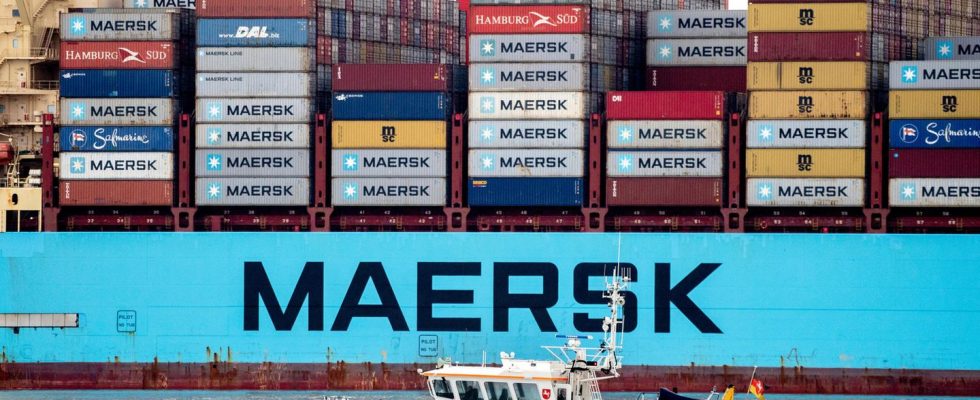Disrupted supply of goods
From Aldi to Tesla: Houthi attacks on cargo ships cause delivery problems
Shipping companies like Maersk are currently sending their container ships on the long detour around Africa
© Hauke-Christian Dittrich / DPA
Because of the Houthi attacks in the Red Sea, many container ships are currently not sailing through the Suez Canal. This also causes delivery problems for companies in Germany.
A large proportion of the goods that reach local regions by container ship from Asia are normally channeled through the bottleneck of the Suez Canal. Because of the attacks, many shipping companies are now avoiding the route that skirts the Yemeni coast. According to freight provider Flexport, the proportion of container giants taking the Suez Canal route has fallen from 66 to 3 percent since the end of November. 85 instead of 13 percent of these ships now take the alternative route around the Cape of Good Hope. However, the ships need around two weeks longer for this.
Tesla factory is at a standstill, Aldi is waiting for promotional goods
This has a drastic impact on the Tesla factory in Grünheide, Brandenburg. Because parts required for production from Asia – especially Chinese battery cells – are missing, the Tesla factory has to stop production until mid-February. “The significantly longer transport times create a gap in the supply chains,” explained the company. German car manufacturers are less affected because they source more batteries from Europe.
But delivery delays are also causing problems in other industries. The business with promotional goods at retailers such as Lidl and Aldi is affected. The special promotions for household goods and similar items, which often come from the Far East, are strictly timed throughout the year. On Thursday, Aldi Nord announced that it would postpone advertising campaigns for certain non-food products until the arrival of the promotional goods was assured.
According to Handelsblatt, importers of food and pet food are also complaining that ordered products are currently arriving with delays of up to 20 days. Discounter Lidl speaks of delivery delays for individual products, but in principle the supply of goods to the branches is guaranteed. The HDE trade association told the food newspaper that visible bottlenecks are not to be expected in the short or medium term.
Are prices rising?
But even if consumers in Germany are not threatened with empty shelves, they could still feel the consequences of the crisis. The current situation is driving up dealers’ transport costs, which can also be reflected in higher prices for customers.
There is currently no sign that the situation in the Red Sea will calm down. Over the past two nights, US forces have bombarded Houthi positions in Yemen. The Iran-backed Houthis announced that they would continue their attacks on commercial ships, which US President Joe Biden wants to respond to with further measures. An EU naval mission with Germany’s participation is also currently being discussed. However, experts say it is difficult to completely secure shipping in the region through military action by the West.


